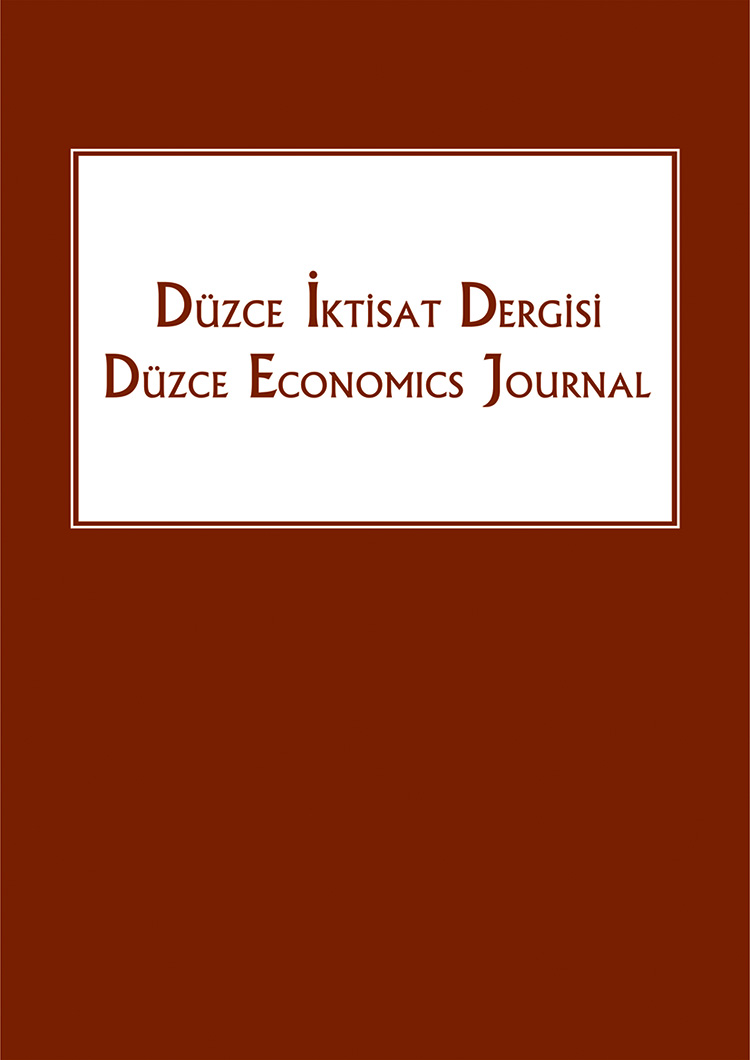Araştırma Makalesi | Açık Erişim
Düzce İktisat Dergisi 2025, Clt. 6(1) 1-18
The Dynamics of Energy Import Dependence in the Baltic States
ss. 1 - 18
Yayın Tarihi: Nisan 30, 2025 | Görüntüleme Sayısı: 108/38 | İndirilme Sayısı: 114/38
Özet
This study investigates the determinants of energy import dependency in the Baltic states (Estonia, Latvia, and Lithuania) using panel data from 1995 to 2021. Employing panel ARDL and FMOLS methods, the analysis identifies long-term relationships between energy import dependency and key factors such as renewable energy consumption, trade, carbon intensity, industrial competitiveness, and export quality. Findings reveal that while renewable energy use and high export quality reduce dependency, carbon intensity and industrialization increase it. These results highlight the Baltic states' transition towards energy independence, contributing to discussions on regional energy security, sustainability, and European integration within the framework of SDG-7.
Anahtar kelimeler: Energy import dependency, Baltic states, Renewable energy, Carbon intensity, Industrialization
APA 7th edition
SENGUL, S. (2025). The Dynamics of Energy Import Dependence in the Baltic States. Düzce İktisat Dergisi, 6(1), 1-18.
Harvard
SENGUL, S. (2025). The Dynamics of Energy Import Dependence in the Baltic States. Düzce İktisat Dergisi, 6(1), pp. 1-18.
Chicago 16th edition
SENGUL, Serkan (2025). "The Dynamics of Energy Import Dependence in the Baltic States". Düzce İktisat Dergisi 6 (1):1-18.
Acheampong, A. O., Adams, S., & Boateng, E. (2021). Do globalization and renewable energy contribute to carbon emissions mitigation in Sub-Saharan Africa? Science of the Total Environment, 755, 142569. https://doi.org/10.1016/j.scitotenv.2020.142569
Ali, S., Shakoor, H., & Shahbaz, M. (2021). Renewable energy and environmental quality: A global panel analysis. Renewable Energy, 178, 379–389. https://doi.org/10.1016/j.renene.2021.06.097
Aslantürk, Y., & Kıprızlı, S. (2020). Renewable energy’s role in improving energy security and reducing energy dependency: Evidence from Turkey. Energy Policy, 144, 111676. https://doi.org/10.1016/j.enpol.2020.111676
Bluszcz, A. (2016). European economies in terms of energy dependence. Quality & Quantity, 51(5), 1531–1548. https://doi.org/10.1007/s11135-016-0350-1
Boneva, S. (2018). Analysis of the energy dependence of the European Union. European Journal of Economics and Business Studies, 4(1), 42–50. https://doi.org/10.2478/ejes-2018-0004
Breitung, J. (2000). The local power of some unit root tests for panel data. In B. H. Baltagi (Ed.), Advances in Econometrics: Vol. 15. Nonstationary panels, panel cointegration, and dynamic panels (pp. 161–178). Amsterdam: JAI Press.
Budginaite-Froehly, J. (2024). Transatlantic energy security from a Baltic perspective. Foreign Policy Research Institute. https://www.fpri.org
Carfora, A., Pansini, R. V., & Scandurra, G. (2022). Energy dependence, renewable energy generation and import demand: Are EU countries resilient? Renewable Energy, 195, 1262–1274. https://doi.org/10.1016/j.renene.2022.06.098
Domac, J., Richards, K., & Risovic, S. (2005). Socio-economic drivers in implementing bioenergy projects. Biomass & Bioenergy, 28(2), 97–106. https://doi.org/10.1016/j.biombioe.2004.08.002
Dokas, I., Panagiotidis, M., Papadamou, S., & Spyromitros, E. (2022). The determinants of energy and electricity consumption in developed and developing countries: International evidence. Energies, 15(7), 2558. https://doi.org/10.3390/en15072558
FPRI (Foreign Policy Research Institute). (2024). Transatlantic energy security from a Baltic perspective. https://www.fpri.org
Iancu, I. A., Hendrick, P., Micu, D. D., & Cirstea, S. D. (2023). The demand for energy imports from non-renewable resources in the EU-27 economy. Energies, 16(13), 5177. https://doi.org/10.3390/en16135177
Im, K. S., Pesaran, M. H., & Shin, Y. (2003). Testing for unit roots in heterogeneous panels. Journal of Econometrics, 115, 53–74. https://doi.org/10.1016/S0304-4076(03)00092-7
Kukharets, V., Hutsol, T., Kukharets, S., Glowacki, S., Nurek, T., & Sorokin, D. (2023). European Green Deal: The impact of the level of renewable energy source and gross domestic product per capita on energy import dependency. Sustainability, 15(11), 11817. https://doi.org/10.3390/su151511817
Lawson, L. A. (2020). GHG emissions and fossil energy use as consequences of efforts of improving human well-being in Africa. Environmental Economics and Policy Studies, 22, 457–480. https://doi.org/10.1007/s10018-020-00263-9
Maddala, G. S., & Wu, S. (1999). A comparative study of unit root tests with panel data and a new simple test. Oxford Bulletin of Economics and Statistics, 61(S1), 631–652. https://doi.org/10.1111/1468-0084.0610s1631Murshed, M., Mahmood, H., Alkhateeb, T. T. Y., & Bassim, M. (2020). The impacts of energy consumption, energy prices, and energy import-dependency on gross and sectoral value-added in Sri Lanka. Energies, 13(24), 6565. https://doi.org/10.3390/en13246565
Najm, S., & Matsumoto, K. (2020). Does renewable energy substitute LNG international trade in the energy transition? Energy Economics, 92, 104964. https://doi.org/10.1016/j.eneco.2020.104964
Ozturk, I. (2010). A literature survey on energy–growth nexus. Energy Policy, 38(1), 340–349. https://doi.org/10.1016/j.enpol.2009.09.024
Pedroni, P. (1999). Critical values for cointegration tests in heterogeneous panels with multiple regressors. Oxford Bulletin of Economics and Statistics, 61, 653–670. https://doi.org/10.1111/1468-0084.0610s1653
Pedroni, P. (2000). Fully-Modified OLS for heterogeneous cointegrated panels. Advances in Econometrics, 15, 93–130. https://doi.org/10.1016/S0731-9053(00)15004-2
Pesaran, M. H. (2007). A simple panel unit root test in the presence of cross-section dependence. Journal of Applied Econometrics, 22(2), 265–312. https://doi.org/10.1002/jae.951
Phillips, P. C., & Hansen, B. E. (1990). Regression with I(1) processes. Review of Economic Studies, 57, 99–125. https://doi.org/10.2307/2297545
Ratha, K. K., & Patnaik, B. C. M. (2019). Fossil fuel versus renewable energy consumption and its implications on TFP: Evidence from panel data analysis. Renewable Energy, 136, 685–693. https://doi.org/10.1016/j.renene.2018.12.003
Sahu, A. K., & Mahalik, M. K. (2024). Unwrapping the intricate interplay between energy dependency and macroeconomic volatility in OECD countries. Economic Papers. https://doi.org/10.1111/1759-3441.12429
Shahbaz, M., Hye, Q. M. A., Tiwari, A. K., & Leitão, N. C. (2016). Economic growth, energy consumption, financial development, international trade, and CO2 emissions in Indonesia. Renewable and Sustainable Energy Reviews, 25, 109–121. https://doi.org/10.1016/j.rser.2016.05.023
Slišana, D., Gaumigs, G., Lauka, D., & Blumberga, D. (2020). Assessment of energy sustainability in statistical regions of Latvia using energy sustainability index. Environmental and Climate Technologies, 24(2), 160–169. https://doi.org/10.2478/rtuect-2020-0063
Štreimikienė, D., Strielkowski, W., Bilan, Y., & Mikalauskas, I. (2016). Energy dependency and sustainable regional development in the Baltic States: A review. Geographica Pannonica, 20(2), 79–87. https://doi.org/10.18421/GP20.02-04
Ürkmez, İ., & Okyar, M. C. (2022). The effect of renewable energy on energy import dependence: An empirical analysis in Turkey. Journal of Political Sciences, 31(2), 443–462. https://doi.org/10.26650/siyasal.2022.31.1071416
Vaona, A. (2016). The effect of renewable energy generation on import demand. Renewable Energy, 86, 354–359. https://doi.org/10.1016/j.renene.2015.07.062
Yadav, M. S., & Mahalik, M. K. (2024). Exploring the role of renewable energy in energy import dependency: Evidence from 16 emerging economies. Energy Policy, 165, 112–123. https://doi.org/10.1016/j.enpol.2023.112123
